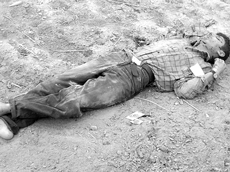Operation Truth, a group of troops from Iraq and Afghanistan, helps foster opposition
The same week that U.S. military fatalities in Iraq surpassed 1,300, a fledging New York-based service members’ organization that is critical of the Bush administration’s handling of the wars in Iraq and Afghanistan has garnered newfound national attention. Operation Truth, a 300-member advocacy group, has emerged as a forceful counterpoint to Pentagon statements indicating that American troops will eventually succeed in pacifying an increasingly virulent insurgency and establish a democracy in Iraq.
The war in Iraq has ground on for more than 20 months, resulting in the deaths of untold Iraqi civilians and thousands of American casualties, including the 19 soldiers killed and scores wounded by a suicide bomber inside a base camp mess hall attack on December 21 near Mosul in northern Iraq.
Yet, according to Michael Massing, a contributor to the December 16, 2004 issue of The New York Review of Books, there has yet to be a single televised image of the killing of an American in Iraq. That sanitized coverage of what is becoming a costly bloodbath seems to motivate the handful of former GIs who staff the phones and stuff the envelopes at Operation Truth’s Astor Place headquarters.
With the public’s confidence in the administration’s ability to prosecute the war and effect a timely withdrawal on an apparent downswing, according to recent polls, the media is casting a more circumspect eye on the war in Iraq.
On December 22, after a daylong round of radio interviews and a stint in CNN’s green room for Paula Zahn’s nightly broadcast, Operation Truth’s leader, Paul Reichkoff, a 29-year-old first lieutenant reservist in the New York National Guard, who served a tour of duty in Iraq, acknowledged, “Outcry, no. Murmur, yes.” Reichkoff conveys a level of intensity that is perhaps not unexpected for a military officer. What is unusual, however, following November’s red-state triumph, in which the GOP depicted John Kerry, a decorated Navy veteran and the Democratic nominee, as a war criminal, is the fervor with which which Reichkoff criticizes the Bush administration’s Iraq policy.
“The American effort in Iraq is not working,” declared Reichkoff, during a telephone interview in which he took pains to describe that while his organization will certainly be described by its detractors as anti-war, Operation Truth is in fact hopeful that it can redefine how the nation perceives its warmaking capacity. “Anti-war is an antiquated term,” Reichkoff said, adding that his group’s mission is to advocate for troops in harm’s way and those returning from Operations Iraqi Freedom and Enduring Freedom, the Afghanistan-based theater of conflict.
Currently, Operation Truth counts its Iraq and Afghanistan troop roster at 300, with 30,000 supporters, including veterans from other wars like Vietnam and the first Gulf war.
The group seeks to articulate a message from the lower ranks up, from the frontline grunt up through the chain of command at Central Command, the entity responsible for combat in both Middle Eastern theaters. The group also lobbies Veterans Affairs officials and high-ranking military brass, who some in Operation Truth regard as having broken a scared pact with enlistees, namely that those who volunteered to serve, particularly after the terrorist attacks of September 11, did so with an understanding that in exchange for putting their bodies on the line, the Pentagon would do everything possible to return them home when their term of service expired and provide for their health and safety.
A December 16 front-page New York Times article warns that a flood of soldiers suffering from post-traumatic stress disorder is about to hit the homeland, a figure that Reichkoff puts at 20 percent of the current force of 150,000 troops serving in Iraq. “It is totally out of the norm to serve 375 days of uninterrupted combat. That was not the case in Bosnia or the first Gulf or other posts like Korea,” said Reichkoff. He faulted the military’s “total lack of planning in biting off more than they could chew—in the insurgency, in equipment, armor and whatnot, in family support. A total failure in planning.” According to him, those troops suffering from mental damage incurred by combat will not receive the services they need to make a safe return to civilian life.
Reichkoff also takes umbrage with the military’s “stop-loss” policy of indefinitely extending tours of duty, a result, he said, of the disastrous decision to invade Iraq with too few boots to hit the ground. “To be militarily successful in Iraq, it would take double what we have there now, or 300,000 troops,” said Reichkoff, a figure he acknowledged could likely not be met without enacting a draft.
Reichkoff said that his group has not taken an official position on Don’t Ask, Don’t Tell, the Pentagon’s de facto ban on gay and lesbian troops serving openly. “I was not aware during my tour of duty of anyone serving openly,” said Reichkoff. “It’s not at all vocalized. It would ruin your career.” In response to a question as to whether or not openly gay troops would impact negatively on a unit’s combat readiness, the rationale proffered by Pentagon officials and congressional officials at the time of Don’t Ask’s enactment in 1993, Reichkoff said that overturning the ban will probably be decided by military necessity, not a penchant for social engineering. Women, he said, were accepted into the military, not because of feminism, but because the military needed to increase enlistments.
A recent study by the Center for Sexual Minorities in the Military, a think tank at the University of California at Santa Barbara led by Prof. Aaron Belkin, asserts that with the attrition of front line troops in what is becoming a drawn-out occupation, an all-volunteer military will eventually need to fill its ranks with qualified individuals, including gays and lesbians. Moreover, said the study’s findings, openly gay and lesbian troops pose no impediment to a unit’s combat efficacy. During the march to war in 2003, gay Marines who were linguists and translators proficient in Farsi, Pashto and Arabic, the languages of the lands where America now finds itself at war, were summarily dismissed from the service.
“We’re past that point now,” said Reichkoff of the military’s dire personnel shortage. “In terms of doctors, linguists, pilots—they are all desperately needed.”
At a screening of the documentary “The Ground Truth” on December 16 at the Quad Cinema, Robert Acosta, 20, of Orange County, California, a former soldier, spoke. It is hard not to notice Acosta’s prosthetic right arm, the result of an attack he and a unit mate fought off, back on the night of July 13, 2003, when a grenade flew into their Humvee as they drove down a road from Baghdad International Airport. Acosta picked up the grenade to fling it away, but the device fell to the vehicle’s floor. When he retrieved it, the grenade exploded, shattering both of the young soldier’s legs and eviscerating his right arm.
In the film, directed and produced by Patricia Foulkrod, Acosta recounts returning to California and after explaining his injury, being asked by a young man, “What war?” to which Acosta replies, “The war in Iraq.” “Is that still going on?” asks the stranger, to which Acosta replies, with barely veiled disdain, “Yeah, dude, it’s still going on.”
Acosta says that he is grateful for his life, but there are times when he wishes the war would have killed him.
In the film, Reichkoff says that first you have to deal with the horror of combat, only to come home and confront the “nightmare that is the Pentagon bureaucracy.”
Despite the massive anti-war protest that took place last August on the weekend before the opening of the Republican National Convention in Madison Square Garden, the war in Iraq has not resulted in the sort of public outrage that occurred during the 1960s when thousands of Americans regularly protested the Vietnam War.
Reichkoff is unapologetically supportive of the U.S. armed forces, and if anything, the organization he leads takes pains to clarify that while its members may oppose the Bush administration’s decision to invade Iraq, theirs is an advocacy group that works to support troops’ ability to fulfill their missions.
On the organization’s Web site, optruth.com, a blog contains stories from active duty personnel and others concerned about the war.
In a message posted on November 30, a soldier who goes by the moniker “oilspill,” wrote: “So I’ve learned to combat against personal ignorance. I also learned that America is great because of Americans, the people. I estimate 75% of the people in the theatre of combat are btween 18-24, and we do an outstanding job. I didn’t work with one person that I thought wouldn’t die for me and I of course would do the same.” The soldier added, “However, if you should protest, make sure you protest the war and not the way its waged. Attack the source but leave the troops on the ground out of it. Finally, regardless of the outcome of the Iraq situation, I think it will be a great opportunity to make America stronger. Thankyou. PS: Protest inbedded reporters. In combat your either in the way or your not, get them out of the way!”
We also publish:


































